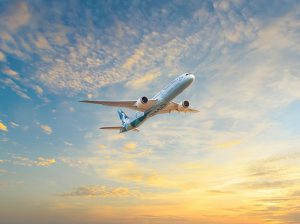Abu Dhabi / WAM
The first Etihad Airways flight to use sustainable aviation fuel (SAF) supplied by ITOCHU Corporation and Neste took off from Tokyo Narita airport on Thursday.
The pioneering flight, EY871 departed Tokyo Narita, was the result of a partnership in which ITOCHU provided Neste MY Sustainable Aviation Fuel to Etihad, the UAE national airline, making Etihad the first international airline to procure SAF in Japan.
Cassie Mackie, Vice President Procurement & Supply Chain of Etihad Airways, said, “The aviation industry needs partnerships like the one we have created with ITOCHU and NESTE to bring widespread SAF adoption to the industry. We are extremely proud to be the first international airline to procure and use Japanese supplied SAF on flights departing Japan and to see this partnership take to the air.
“Etihad is committed to achieving net zero emissions by 2050 and reducing our 2019 emissions by 50 percent by 2035. The industry must get serious about decarbonisation and this type of collaboration between governments, corporates and the aviation sector, which increases SAF supply and availability at airports, helps pave the way for broader adoption.â€
The flight operated on a nearly 40 percent blend of SAF, representing the first delivery of some 50,000 gallons of SAF, to be used over a number of flights in the coming weeks. It is the first time a non-Japanese airline has used SAF supplied in Japan.
The flight reduced CO2 by approximately 75.2 tCO2, based on the estimated fuel volume (20,000 USG) at a blend of 39.66% SAF. The flight also managed non-CO2 environmental impacts through optimised flight planning for contrail prevention, deploying Satavia technology for a forecast net climate impact reduction of 71 tCO2e (carbon dioxide equivalent).
Aircraft condensation trails, or contrails, cause surface warming responsible for up to 60% of aviation’s overall climate footprint. Until recently, technical challenges made contrail prevention difficult or impossible, but UK-based Satavia’s atmospheric modelling now enables flight plan optimisation for contrail prevention in addition to post-flight climate impact analysis.
In December 2021, the Japanese government announced the goal of replacing 10 percent of aviation fuel consumption by Japanese airlines with SAF by 2030. To achieve this goal, ITOCHU established a SAF supply network at Japanese domestic airports across the country for Japanese domestic carriers, which is now being expanded to international carriers, starting with Etihad.
ITOCHU has already established a domestic SAF supply chain at Haneda and Narita International Airports, spanning from SAF import and quality control to delivery to airports, as well as a refueling network for the aircrafts themselves. ITOCHU plans to expand its SAF supply base to Central Japan International Airport and Kansai International Airport, allowing it to further increase the supply of SAF to both Japanese and international airlines.
 The Gulf Time Newspaper One of the finest business newspapers in the UAE brought to you by our professional writers and editors.
The Gulf Time Newspaper One of the finest business newspapers in the UAE brought to you by our professional writers and editors.
